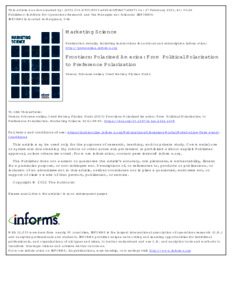|
Frontiers: Polarized America: From political polarization to preference polarization
Schoenmueller, Verena
;
Netzer, Oded
;
Stahl, Florian
![[img]](https://madoc.bib.uni-mannheim.de/64004/1.hassmallThumbnailVersion/mksc.2022.1408.pdf)  Vorschau |
|
PDF
mksc.2022.1408.pdf
- Veröffentlichte Version
Download (1MB)
|
|
DOI:
|
https://doi.org/10.1287/mksc.2022.1408
|
|
URL:
|
https://pubsonline.informs.org/doi/10.1287/mksc.20...
|
|
URN:
|
urn:nbn:de:bsz:180-madoc-640049
|
|
Dokumenttyp:
|
Zeitschriftenartikel
|
|
Erscheinungsjahr:
|
2023
|
|
Titel einer Zeitschrift oder einer Reihe:
|
Marketing Science
|
|
Band/Volume:
|
42
|
|
Heft/Issue:
|
1
|
|
Seitenbereich:
|
48-60
|
|
Ort der Veröffentlichung:
|
Catonsville, MD
|
|
Verlag:
|
INFORMS
|
|
ISSN:
|
0732-2399 , 1526-548X
|
|
Sprache der Veröffentlichung:
|
Englisch
|
|
Einrichtung:
|
Fakultät für Betriebswirtschaftslehre > Quantitatives Marketing und Konsumentenverhalten (Stahl 2013-)
|
|
Bereits vorhandene Lizenz:
|
 Creative Commons Namensnennung, nicht kommerziell, keine Bearbeitung 4.0 International (CC BY-NC-ND 4.0) Creative Commons Namensnennung, nicht kommerziell, keine Bearbeitung 4.0 International (CC BY-NC-ND 4.0)
|
|
Fachgebiet:
|
330 Wirtschaft
|
|
Abstract:
|
In light of the widely discussed political divide and increasing societal polariza-tion, we investigate in this paper whether the polarization of political ideology extends to consumers’ preferences, intentions, and purchases. Using three different data sets—the publicly available social media data of over three million brand followerships of Twitter users, a YouGov brand-preference survey data set, and Nielsen scanner panel data—we assess the evolution of brand-preference polarization. We find that the apparent polarization in political ideologies after the election of Donald Trump in 2016 stretches further to the daily lives of consumers. We observe increased polarization in preferences, behavioral intentions, and actual purchase decisions for consumer brands. Consistent with compensa-tory consumption theory, we find that the increase in polarization following the election of Donald Trump was stronger for liberals relative to conservatives, and that this asymmetric polarization is driven by consumers’ demand for “Democratic brands” rather than the sup-ply of such brands. From a brand perspective, there is evidence that brands that took a political stance observed a shift in their customer base in terms of their customers’ political affiliation. We provide publicly available (http://www.social-listening.org) access to the unique Twitter-based brand political affiliation scores.
|
 | Dieser Eintrag ist Teil der Universitätsbibliographie. |
 | Das Dokument wird vom Publikationsserver der Universitätsbibliothek Mannheim bereitgestellt. |
 Suche Autoren in Suche Autoren in
Sie haben einen Fehler gefunden? Teilen Sie uns Ihren Korrekturwunsch bitte hier mit: E-Mail
Actions (login required)
 |
Eintrag anzeigen |
|
|
 ORCID: 0000-0002-2846-3424
ORCID: 0000-0002-2846-3424



 Creative Commons Namensnennung, nicht kommerziell, keine Bearbeitung 4.0 International (CC BY-NC-ND 4.0)
Creative Commons Namensnennung, nicht kommerziell, keine Bearbeitung 4.0 International (CC BY-NC-ND 4.0) Suche Autoren in
Suche Autoren in